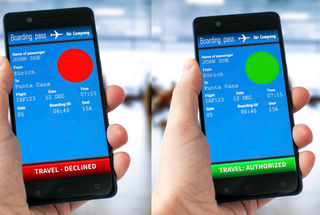Vaccine Passports Would Be a Welcome Shot in the Arm for the Hospitality Industry

As a result of Covid, global travel has become increasingly localised and complicated. The International Air Transport Association (IATA) recently announced that full-year global passenger traffic results for 2020 fell by 65.9 per cent compared to the previous year, by far the sharpest traffic decline in aviation history.
The easy travel and relatively free movement that has underpinned the travel and hospitality sectors has evaporated, almost overnight. However, there is hope. As countries begin to roll-out their vaccination programmes, there is the prospect that vaccine passports may get people back in the air and the hospitality sector back on its feet.
The UK Minister for Covid-19 Vaccine Deployment, Nadhim Zahawi MP, said the UK government was "looking at the technology", adding that it could be used by venues in a similar way to the test and trace app. The move comes after the Ada Lovelace Institute launched an open call for evidence as part of a review into the use of vaccine passports.
Funded by Innovate UK, the passport would take the form a free app. However, it would not be the first example of its type. There is precedent for vaccine passports. Some countries already require immunisation certificates for diseases such as polio or yellow fever to prevent their global spread. Health certificates are also beginning to be trialled by hotels. Sidehide, a contactless online reservations platform, announced in May it would partner with Onfido to deliver a contactless booking system using immunity passports.
Alongside this, many airlines are already testing CommonPass, an app backed by the World Economic Forum which aims to provide an internationally accepted proof of Covid status. Airlines including Cathay Pacific, JetBlue, Lufthansa, Swiss Airlines, United Airlines and Virgin Atlantic, as well as hundreds of health systems across the United States are on board with the idea.
The app would allow users to upload medical data, such as a Covid-19 test result or a proof of vaccination by a hospital or medical professional. This would generate a health certificate or pass in the form of a code that could be shown to authorities without revealing any personal information.
Beyond the technological challenge of creating a viable passport, the logistical challenge of putting passports into action is achievable. As a downloadable app, a vaccine passport would be quicker to roll-out than a vaccine. There is no doubt that, for the hospitality and events industries, the impact would be far reaching. It would offer travellers the chance to go on holiday or a business trip safe in the knowledge that their fellow passengers have been vaccinated. It could allow sports and music fans to return to stadiums in large numbers - rather than at reduced capacity.
It would help get the hospitality sector back on its feet and welcoming the return of customers. It would help the live music and entertainment sectors resume their concerts and performances in arenas, stadiums and theatres.
It could allow upcoming global events such as the Olympics to take place, safe in the knowledge that fans have either been tested or vaccinated and could authenticate their status. In short, a vaccine passport would be a welcome shot in the arm for the hospitality industry.
A vaccine passport could even boost vaccine uptake. By offering a safer path back to normality, a passport could give people an additional incentive to get vaccinated.
Vaccine passports also offer increasing opportunities to companies in the rising hospitality tech space. A British technology company has already developed a secure health passport wallet that can be used internationally. VST Enterprises' V-Health Passport is designed to not only facilitate travel but enable businesses in the hospitality sector to share the latest offers and discounts with customers.
There are, of course, a number of considerations with the concept of a health passport. Covid-19 is a fast-moving virus, and we don't yet know if immunisation stops someone being contagious. We need to understand as much as we can about the exact protection Covid-19 vaccines provide before we fully embrace vaccine passports as part of the new travel and hospitality sector that will emerge out of the pandemic.
The current pandemic has brought with it many uncertainties - but as our understanding of the protection offered by the vaccine grows, we should be open to any innovation that will make people safer and get hospitality businesses back on their feet.
If we don't act and get people moving again, it could have consequences far beyond the hospitality industry. It could restrict our horizons and disrupt the globalised world. In the face of dark times, it is often technology and science that lights the way. The way we travel may never be the same - but we can take this opportunity to upgrade the hospitality industry and ensure the sector that emerges from the pandemic is smarter, safer and more efficient than ever before.